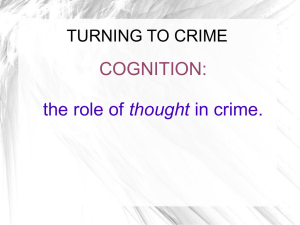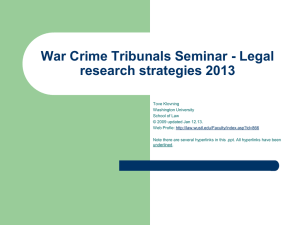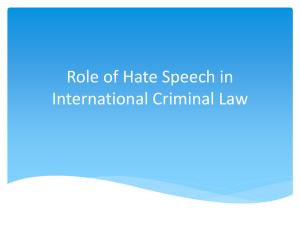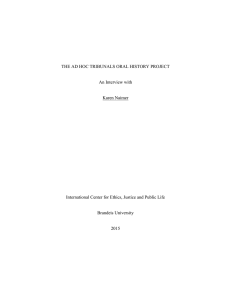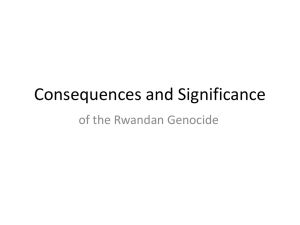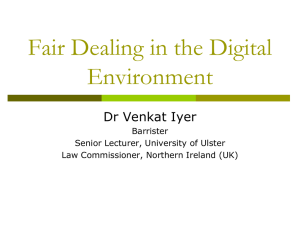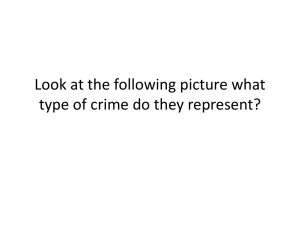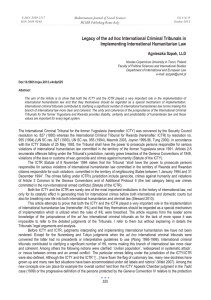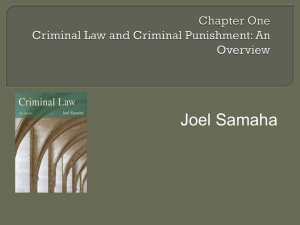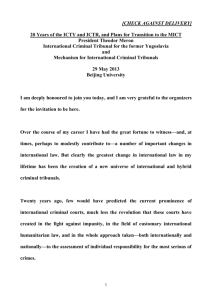DEALING WITH INTERNATIONAL CRIME
advertisement
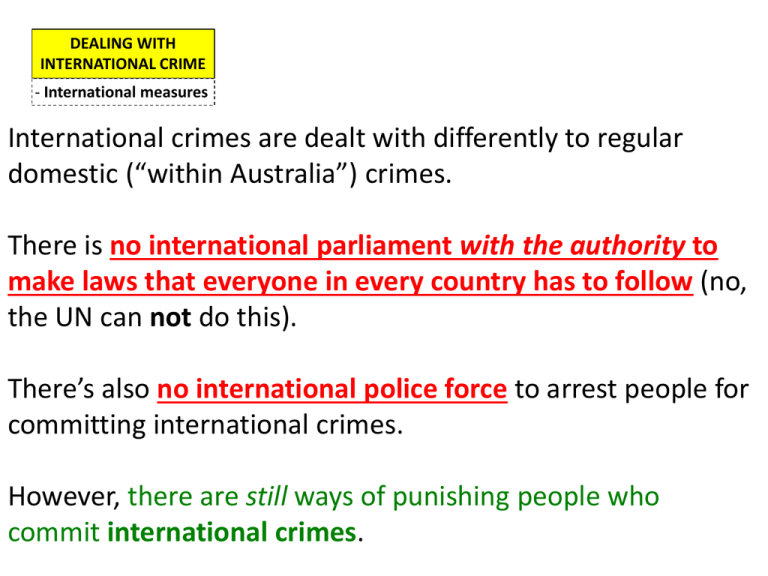
DEALING WITH INTERNATIONAL CRIME - International measures International crimes are dealt with differently to regular domestic (“within Australia”) crimes. There is no international parliament with the authority to make laws that everyone in every country has to follow (no, the UN can not do this). There’s also no international police force to arrest people for committing international crimes. However, there are still ways of punishing people who commit international crimes. DEALING WITH INTERNATIONAL CRIME - International measures There’s no way we’ve got enough time to go through the ways of dealing with every type of international crime, so we’ll just focus on Crimes Against Humanity (the most serious crimes against the international community) Between 1945-1990 – genocide claimed more than 180 million lives Almost none of the people involved in this were prosecuted during that time BUT, in the past 20 years: lots of progress in prosecuting those involved in international crime System of international criminal justice: ICTY Ad hoc Tribunals Set up after specific events (International Criminal Tribunal for the former Yugoslavia) ICTR (International Criminal Tribunal for Rwanda) International Criminal Court Since 2002 Deals with current & future crimes against humanity DEALING WITH INTERNATIONAL CRIME - International measures The International Criminal Tribunal for the Former Yugoslavia (ICTY) This was created by a UN Security Council Resolution (decision) in 1993. It has jurisdiction (power) over breaches of the Geneva Conventions and international customary law committed in the former Yugoslavia since 1991. DEALING WITH INTERNATIONAL CRIME - International measures The International Criminal Tribunal for the Former Yugoslavia (ICTY) BIG ICTY CASE 1: Slobodan Milošević - Arrested for ‘war crimes’ and ‘crimes against humanity’ in 2001, placed on trial in 2002 and died just before the end of his trial in 2006. - This was obviously not very effective because it took soooooo long to try him that he literally died waiting for his trial to finish. DEALING WITH INTERNATIONAL CRIME - International measures The International Criminal Tribunal for the Former Yugoslavia (ICTY) BIG ICTY CASE 2: Radovan Karadižić - Still on trial. - Already acquitted of one count of genocide. DEALING WITH INTERNATIONAL CRIME - International measures The International Criminal Tribunal for the Former Yugoslavia (ICTY) BIG ICTY CASE 3: Ratko Mladić (AKA “God”) - Big role in the Srebrenica massacre. DEALING WITH INTERNATIONAL CRIME - International measures Evaluation of the ICTY: There have been 64 convictions of war criminals so far. Victims groups feel this is not enough, given the time taken and the cost of the court. DEALING WITH INTERNATIONAL CRIME - International measures Evaluation of the ICTY: “Justice is never perfect… The ICTY is slow, it is bureaucratic, and it is unloved by almost every nationality and ethnic group in the former Yugoslavia. But it has transformed butchers and gods back into men”. House of Good and Evil (The Australian 2012) DEALING WITH INTERNATIONAL CRIME - International measures The International Criminal Tribunal for Rwanda (ICTR): Created in 1994 and it has jurisdiction (power) over the genocide that was committed in Rwanda in 1994. It is supposed to finish its work before 2015. DEALING WITH INTERNATIONAL CRIME - International measures The International Criminal Tribunal for Rwanda (ICTR): Created in 1994 and it has jurisdiction (power) over the genocide that was committed in Rwanda in 1994. BIG ICTR CASE: Kambanda (1998) - Only Head of State (PM) to plead guilty to genocide - Serving life in prison DEALING WITH INTERNATIONAL CRIME - International measures Evaluation of the ICTR: 1. Acquittals In 2009 and 2013, there were some surprise acquittals by the ‘Appeals Chamber’ (like our Court of Criminal Appeal) of high-ranking members of the Rwandan government at the time of the genocide. These situations led to large protests. DEALING WITH INTERNATIONAL CRIME - International measures Evaluation of the ICTR: 2. Cost People in Rwanda have also been upset because there have only been 48 convictions by the court and it has cost over $1.7 billion. This is in contrast to the Gacaca Traditional Courts in Rwanda, which have put almost 2 million people on trial since 1994 at a cost of only $40 million. DEALING WITH INTERNATIONAL CRIME - International measures The International Criminal Court: It used to be that every time there was a war or something, they had to make a whole new court to put the war criminals on trial. These were called ad hoc tribunals, ‘ad hoc’ meaning “as the situation arises” (e.g. The Nuremburg Trials after WW2, the ICTY, ICTR, etc). So, in 1998, a whole group of countries signed the Rome Statute to start up one main International Criminal Court (the ICC). DEALING WITH INTERNATIONAL CRIME - International measures The International Criminal Court: The ICC is in the Netherlands (in a place called The Hague) where people who commit crimes like genocide can be put on trial. EFFECTIVENESS ISSUE: The United States has tried its best to sabotage the court because they don’t want Americans being put on trial by anyone but Americans. They have encouraged other countries to not cooperate with the court. DEALING WITH INTERNATIONAL CRIME - International measures Evaluation of the ICC: The ICC only recently got its first conviction (Thomas Lubanga (2012) from the Democratic Republic of the Congo), which shows what a long process it is. DEALING WITH INTERNATIONAL CRIME - International measures Evaluation of the ICC: In the same year, it also had its first acquittal (Ngudjolo (2012)). This raised questions about the ability of the prosecutors to get a conviction… … BUT, at least it shows that the court is impartial (it isn’t just going to convict everyone – there is a proper trial process happening). DEALING WITH INTERNATIONAL CRIME - International measures Evaluation of the ICC: There have also been accusations of an African bias in the cases…
